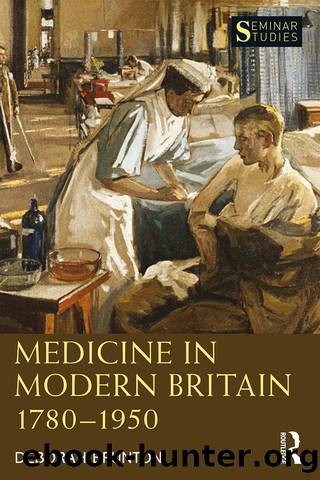Medicine in Modern Britain 1780-1950 by Deborah Brunton

Author:Deborah Brunton [Brunton, Deborah]
Language: eng
Format: epub
Tags: History, General, Europe, Great Britain, Modern, 18th Century, 19th Century, 20th Century
ISBN: 9780429949098
Google: MbJjDwAAQBAJ
Publisher: Routledge
Published: 2018-07-11T01:32:57+00:00
Excluding competitors
For much of the nineteenth century, practitioners perceived themselves to be in an intense struggle to make a decent living. From the 1820s, there were regular complaints that the profession was overcrowded, with too many doctors chasing too few fees. In fact, although the numbers of practitioners rose significantly over the century â from over 17,000 in 1841 to over 23,000 by 1911 â the population grew even faster, and the ratio of practitioners to population actually fell (Digby, 1994, p. 32). In an effort to reduce competition, and thus increase their incomes, practitioners engaged in a long battle to exclude unqualified and heterodox practitioners from the medical marketplace. In the early nineteenth-century, practitioners complained of unfair competition from druggists, who sold over-the-counter medicines at lower prices than those charged by practitioners. Later, heterodox practitioners, especially homeopaths, were portrayed as taking patients away from orthodox practitioners and treating them with useless, or even dangerous, remedies.
From the 1810s to the 1850s, practitioners sought to push out these competitors through the reform of licensing. From the 1800s, practitioners campaigned to establish a clear boundary between qualified practitioners and the medically untrained druggists, and to create a new medical licence for general practitioners, replacing the existing system of licensing through the Colleges of Physicians and of Surgeons and the Societies of Apothecaries [Document 28, p. 147]. However, the new regulations introduced by the Apothecaries Act of 1815, which was drawn up by the London Colleges of Physicians and Surgeons, failed to provide a basis for prosecuting druggists. Although the Society of Apothecaries was given powers to prosecute unlicensed practitioners, the costs of legal action meant that by 1822 only two practitioners had been taken to court. Perhaps not surprisingly, the act reaffirmed the role of the old corporations in licencing practitioners. Candidates for the Society of Apothecariesâ licence had to prove that they had completed a five-year apprenticeship, attended courses in a range of medical subjects and received six months clinical training. The Apothecaries Act reflected current patterns of education, although the insistence on an apprenticeship was seen as a retrograde step by many practitioners, confirming their status as members of a trade where apprenticeship was the standard form of training (Holloway, 1966; Lawrence, 1991).
The Apothecaries Act did little to halt the demand for reform, although the target of practitionersâ discontent shifted from druggists to heterodox practitioners, especially homeopaths [Document 29, p. 148]. They were always a small minority within the profession â in 1853, there were around 170 homeopathic practitioners, a figure roughly equal to 1% of orthodox practitioners (Digby, 1994). Between 1840 and 1858 no fewer than 15 bills, drawn up by practitioners or the London Colleges, were presented to parliament but none attracted enough support to become law. The Medical Reform Act that finally passed in 1858 was a compromise. The act did not include any sanctions against heterodox practitioners unless they falsely claimed to have a licence. Instead, it established the General Medical Council (GMC), made up of elite practitioners, which issued guidelines on the minimum level of education.
Download
This site does not store any files on its server. We only index and link to content provided by other sites. Please contact the content providers to delete copyright contents if any and email us, we'll remove relevant links or contents immediately.
18 real-life stories of serial killers and murderers with solved and unsolved killings from the USA, UK, Europe, and beyond. by Ben Oakley(167)
Who's Who in the Zulu War, 1879: The British by Adrian Greaves Ian Knight(163)
Design, construction, and validation of optogenetic proteins by Colin P. O'Banion & Anwesha Goswami & David S. Lawrence(111)
The Battle of Austerlitz by 50minutes(108)
Interest and Connection in the Eighteenth Century by Jacob Sider Jost(105)
Fires of Faith by Catholic England under Mary Tudor(105)
The Seeker by S. G. MacLean(102)
The Origins of French Absolutism, 1598-1661 by Alan James(100)
Invisible Worlds by Peter Marshall(98)
The Slave Trade in Africa by Simon Webb;(96)
A Cultural History of Theatre in the Age of Enlightenment by Leon Mechele;(93)
Islam and the Trajectory of Globalization by Louay M. Safi(92)
Witchcraft in Early Modern England by James Sharpe(92)
Medicine in Modern Britain 1780-1950 by Deborah Brunton(91)
A Genius for Confusion by Richard M. Fried(89)
The Thirty Years War â Complete by Friedrich Schiller(88)
Pentecostal Republic by Ebenezer Obadare(85)
Practices of Diplomacy in the Early Modern World c.1410-1800 by Tracey A. Sowerby Jan Hennings(81)
Married Women in Legal Practice by Charlotte Cederbom(78)
